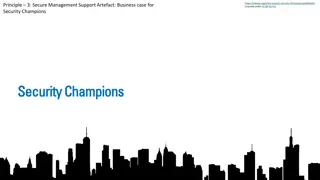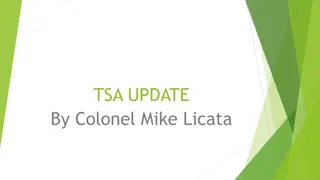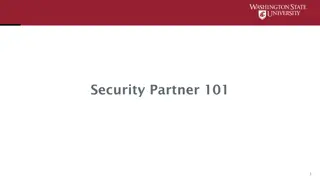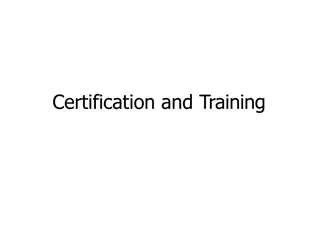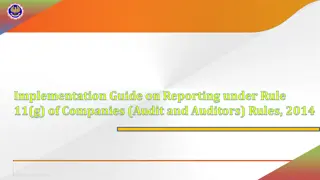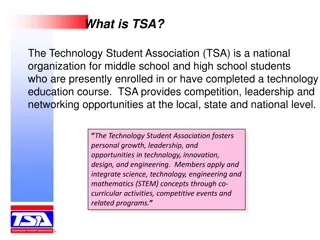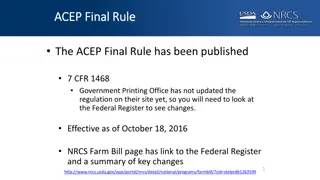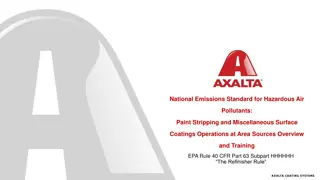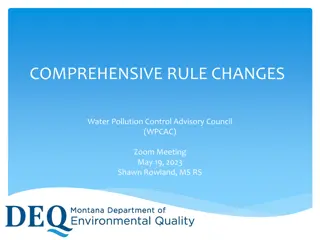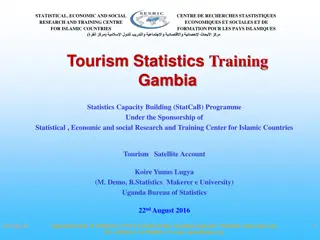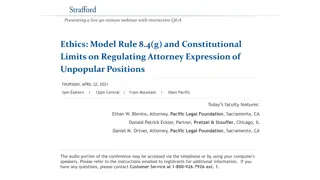TSA Updates on Security Training Rule for OTRB Companies
In the recent updates by TSA, the Security Training Rule for over-the-road bus (OTRB) companies has been highlighted. The rule mandates TSA-approved security training for employees in security-sensitive roles, emphasizing key requirements and elements of security training. Urban areas covered by the rule and applicability flowchart are discussed, providing insight into the regulations. Stakeholders are encouraged to engage and comply with the directives to enhance security measures effectively.
Download Presentation

Please find below an Image/Link to download the presentation.
The content on the website is provided AS IS for your information and personal use only. It may not be sold, licensed, or shared on other websites without obtaining consent from the author. Download presentation by click this link. If you encounter any issues during the download, it is possible that the publisher has removed the file from their server.
E N D
Presentation Transcript
TSA Updates Ben Currier Surface Policy Division Policy, Plans, & Engagement American Bus Association, Marketplace 2023 February 5, 2023
Agenda Introduction Industry Engagement Manager (Highway) OTRB Security Training Rule TSA Security Directives & Information Circulars Cyber Policy/Rulemaking Security Initiatives & Resources: TSA Engagement with ABA Security stakeholders Guidance Documents, Exercises, & Workshops Baseline Assessment for Security Enhancement (BASE) Program TSA Regions 2
Security Training Rule - OTRB The rule went in to effect on September 1, 2020. Codified at 49 CFR Subchapter D, Parts 1570 and 1584. The rule requires owner/operators of higher-risk freight railroad carriers, public transportation agencies (including rail mass transit and bus systems), passenger railroad carriers and over-the-road bus (OTRB) companies to provide TSA-approved security training to employees who perform security-sensitive functions. 49 CFR 1584.101 Applicability The requirements of this subpart apply to each OTRB owner/operator providing fixed-route service that originates, travels through, or ends in a geographic location identified in appendix A to this part. 3
Key Requirements of the Rule Each Entity covered by this rule must: Designate a Security Coordinator and at least one alternate Security Coordinator Report significant security concerns to TSA Develop a comprehensive security training program Provide security training to employees in security- sensitive positions 6
Required Elements of Security Training Training must address: Employee (craft) specific responsibilities Duties as applicable in the security program PREPARE Awareness and recognition of suspicious persons and items OBSERVE Determine if an item or situation requires a response ASSESS Know how to report and react to security threats RESPOND 7
How to Notify TSA if the Rule Applies to your Company Send an email to: SecurityTrainingPolicy@tsa.dhs.gov. Include in the subject line of the email: Security Training Rule Applicability (Company name) Include in the body of the email: o Mode of Transportation (e.g. Over-the Road bus) o Owner/operator corporate name o Doing business as (DBA) name o Corporate address o Contact name, email address, and telephone number 8
TSA Information Circulars (Cyber) TSA has issued three Cybersecurity Information Circulars (IC) for surface transportation operators: Surface Transportation IC-2021-01 (December 2021) for railroads, public transportation agencies, and certain over-the-road bus operator recommends designation of cybersecurity coordinator, reporting of cybersecurity incidents to CISA, developing and implementing a cybersecurity incident response plan, and completing a cybersecurity vulnerability assessment. Surface Transportation IC-2022-01 (February 2022) for railroads, public transportation agencies, and certain over-the-road bus operators recommended reviewing and implementing the recommended actions in the Joint Cybersecurity Alert, Understanding and Mitigating Russian State-Sponsored Cyber Threats to U.S. Critical Infrastructure and the Cybersecurity and Infrastructure Security Agency s Shields Up site. 9
TSA Information Circulars (Cyber) cont. Surface Transportation IC-2022-02 (March 2022) for railroads, public transportation agencies, rail transit agencies, pipelines, and certain over- the-road bus operators recommended reviewing and implementing the recommended actions in two Joint Cybersecurity Advisories issued on March 15 Russian State Actors (AA2-074A) and on March 17 Strengthening Cybersecurity of SATCOM Network providers and customers (AA22-076A). 10
Future Cyber Policy/Rulemaking Forthcoming issuances of other SDs/ICs Issued Advanced Notice of Proposed Rulemaking on pipeline, rail transit, and passenger rail cybersecurity risk management programs Coordinate with DHS Policy and other DHS Components on the development of cybersecurity standards and regulations 11
Security Initiatives and Resources TSA engagement with ABA Security Committee Monthly telephonic meetings with TSA and ABA stakeholders Surface Transportation Security Advisory Committee (STSAC) Continued STSAC member opportunities in the 2023 membership cycle Participate in STSAC as industry subject matter experts on a sub-committee: 1) Security Risk and Intelligence, 2) Cybersecurity Information Sharing, 3) Insider Threat, and 4) Emergency Management and Resiliency Next (closed) meeting scheduled for February 16, 2022 tsa.gov/for-industry/surface-transportation-security 12
Security Initiatives and Resources Guidance documents: TSA, Motor Coach Counterterrorism Guide TSA, Motor Coach Security Best Practices DHS, Planning and Response to an Active Shooter: An Interagency Security Committee Policy and Best Practices Guide Exercises & Workshops: Facilitated by TSA and/or the Cybersecurity and Infrastructure Security Agency at the national and field levels TSA has regional points of contact in the field to coordinate training and exercises 13
TSA BASE Program The TSA Highway Baseline Assessment for Security Enhancement (BASE) program includes: Structured security assessments Designed as a free, voluntary program TSA-certified Security Action Items (SAIs) Assessments conducted locally by Transportation Security Inspectors-Surface (TSI-S) Includes: Motorcoach/Over-the-Road-Bus Operators, Trucking, School Districts, and School Bus Operators High level Executive Summary New for Fiscal Year 2023, the Cybersecurity BASE (Cy-BASE) Program Based upon the National Institute of Standards and Technology Cybersecurity Framework Conducted in collaboration with Regional Cyber Subject Matter Experts Since Fiscal Year 2005, TSA has conducted approximately 1,078 Highway BASE assessments 14
BASE Procedures & Benefits 1. ESTABLISHa baseline of the company s internal security processes, procedures, and policies against the TSA-developed security recommendations. 2. IDENTIFY security program strengths and areas for improvement. Interview Security Coordinators, Operators, or Cybersecurity Coordinators Verify Information with Management and Frontline Employees 3. ELEVATEthe company s overall security posture through development of corrective action recommendations to remediate any security program vulnerabilities detected during the review. Observe Security Measures in Place Review Relevant Documents 4. ENHANCE security partnership between TSA and transportation stakeholders through ongoing engagement. For further BASE Program information please contact STSIP@tsa.dhs.gov 15
TSA - Surface Operations Field Leadership 5 Regional Security Offices Regional Security Directors Regional Security Inspectors 16
Questions & Contact Information TSA Industry Engagement Manager - Highway & Motor Carrier Ben Currier Mobile: 571-361-3921 Office: 571-227-5839 benjamin.currier@tsa.dhs.gov TSA BASE Program STSIP@tsa.dhs.gov 17



